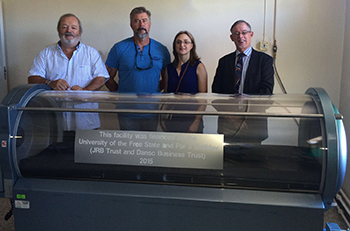Latest News Archive
Please select Category, Year, and then Month to display items
14 June 2024
|
Story Anthony Mthembu
|
Photo Suplied
 Jeremiah Hlahla, a UFS student completing his PhD in Botany at the University of Debrecen as part of an exchange initiative funded by the Erasmus+ Mobility Programme.
Jeremiah Hlahla, a UFS student completing his PhD in Botany at the University of Debrecen as part of an exchange initiative funded by the Erasmus+ Mobility Programme.
As part of an exchange initiative facilitated by the Erasmus+ Mobility Programme, Jeremiah Hlahla, a student at the University of the Free State (UFS), is nearing the completion of his PhD studies at the University of Debrecen in Hungary. Hlahla’s journey, which began in February 2024 and is set to conclude in July 2024, has been a remarkable learning opportunity. “As a first time-traveller to Europe, I have thoroughly enjoyed engaging with people from different countries and cultures,” he said.
The benefits of international collaboration
Hlahla is currently pursuing a PhD in Botany, focusing on plant stress physiology. “My current PhD project investigates the physiological, biochemical and morphological responses of vegetable-type soybean, or edamame, to combined drought and heat stress,’’ he explained. He considers the University of Debrecen the ideal institution to complete his research due to its extensive expertise and resources in similar projects. He noted that his colleagues at Debrecen conduct significant work on plant protection against biotic and abiotic stresses, including salt and drought stress, as well as proteins and amino acids in barley and other legumes.
Given the vast knowledge available on similar projects, Hlahla has found substantial engagement with his work at the University of Debrecen. “Upon arrival, I delivered an introductory lecture presenting my UFS project on the synergistic effects of combined drought and heat stress on the physiology and biochemistry of edamame. It was an engaging session as everyone could relate to my work and asked many questions,’’ he said.
Insights gained from the exchange
Hlahla has also gained valuable lessons that will assist him in his research career, including biotechnology and physiology tools. “I learned how to prepare samples and use high-performance liquid chromatography (HPLC) and reversed-phase ultra-high-performance liquid chromatography (UHPLC) to quantify proteins and amino acids,’’ he said. These techniques are beneficial not only for his current work but will also support future soybean research.
As his experience at the University of Debrecen nears its end, Hlahla reflects on the collaborations and friendships he has formed, which stand out as a significant highlight.
Department of Oncology provides hyperbaric chamber to cancer patients – a first in the Free State
2016-03-21

From the left: De Villiers Brink, Gys Botes (both of the Par3 Golfday group that donated towards the hyperbaric chamber), Dr Alicia Sheriff (Head of the UFS Department of Oncology) and Prof Gert van Zyl (Dean of the UFS Faculty of Health Sciences). |
Thanks to the Department of Oncology at the University of the Free State (UFS), cancer patients now have access to a hyperbaric chamber – a medical treatment that enhances the body’s healing process through the inhalation of oxygen.
In order to realise this tremendous addition to the treatment of cancer patients, the Department of Oncology established collaboration between the UFS School of Medicine, the Free State Department of Health, and a group of private donors. Currently the only one in the Free State, the hyperbaric chamber has been installed at the Oncology ward at National Hospital in Bloemfontein and will benefit not only patients from the Free State, but also the North West province and the Northern Cape.
While lying down in the chamber, the patient’s body absorbs more oxygen as a result of the high levels of air pressure. This process stimulates the healing of cancer wounds and various other injuries, including sports injuries.
Dr Alicia Sherriff, Head of the Department of Oncology (UFS), says her team is passionate about enhancing the quality of their patients’ lives, even when facing difficult circumstances. “I believe that the hyperbaric chamber is just one way of achieving this, since it helps decrease the harm done by certain medical conditions on the human body,” Dr Sherriff says.